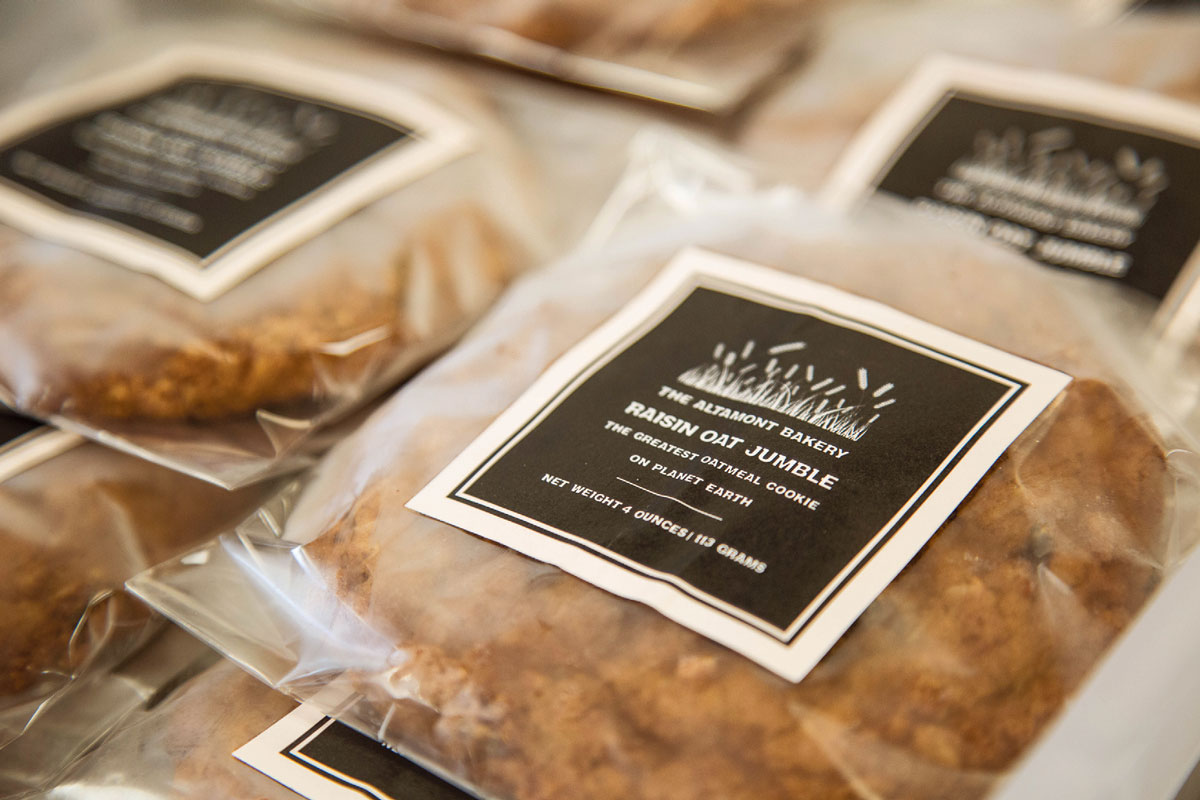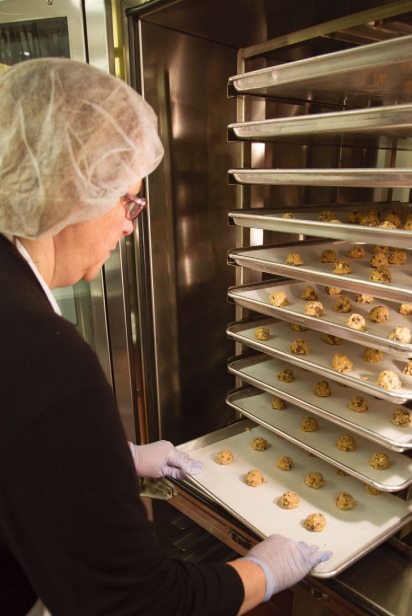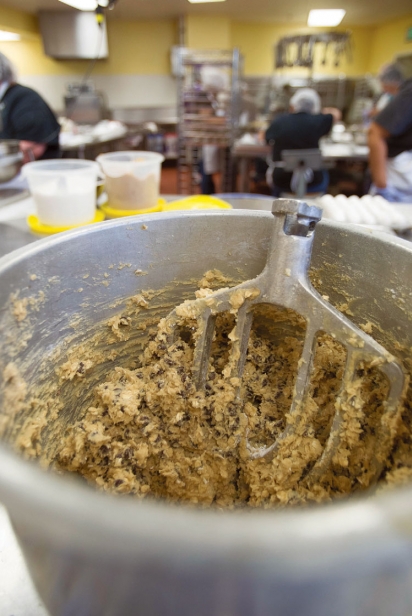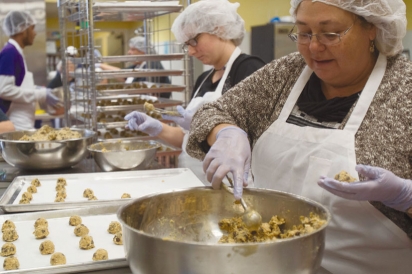B’nai Emunah Synagogue’s Altamont Bakery
Cookies from synagogue’s Altamont Bakery taste good, and do good
The B’nai Emunah Synagogue at 1719 S. Owasso Ave. sits just south of the bars and shops of Tulsa’s robust Cherry Street, directly adjacent to Peoria Avenue. It is a large but unassuming building, its purpose difficult to glean during the span of a chance drive by. Its name on a high wall streetside is hidden behind trees, even in winter, and the scarce few instances of menorah imagery blend into the architecture if you aren’t looking for them.
You would not be blamed for not divining, at first glance, that this is a place of worship. But you’d have to be cheating to guess that it’s also the headquarters of an award-winning bakery, producing thousands of some of Tulsa’s best cookies each and every week.
Even inside, the synagogue on a Tuesday is a zone of palpable, solemn silence—you don’t have to be religious to respect that this is not a place to raise your voice. And aside from the rack of cookies, each individually wrapped, that sits conspicuously near the south doors of the synagogue, there are still few hints to be found of the culinary mission that’s at work within these walls. Which makes it all the more jarring when you’re brought through a door from the sanctuary into a large kitchen, and are met with the sounds of ordered chaos—measuring cups fling flour as racks are stacked with trays full of soft cookie dough, and 13 people are moving, talking, operating mixers—an explosion of noise that’s unexpected even if you are looking for it.
It’s enough to give you whiplash. And now there is an opposite effect—the kitchen is so lively, robust and professionally run, you forget whose roof you’re under. This place is just as much a bakery as it is anything else.
How did this happen?
Incorporated in 1915, and operating with an official congregation by 1916, the synagogue was rebuilt in 2000, an ambitious remodel that included two state-of-the-art kitchens. Rabbi Marc Fitzerman, who with his wife, Alice, conceptualized the Altamont in 2011, says they were always meant to be used for work like this. The story of Altamont, told charmingly on its website, AltamontBakery.com, has always been seen by its authors as a natural continuation of the story of B’nai Emunah. Not a companion tale or side project—it is an aspect of the synagogue long intended to be of a piece with the larger whole.
Rabbi Fitzerman speaks slowly, softly, with every word considered, his manner betraying little of the stress that it must create to run a synagogue side by side with a commercial bakery operation that has its eyes set firmly on expansion. One wonders how they could maintain success in two endeavors that have so little in common. But the rabbi doesn’t see it this way.
“Maybe the key component is that the synagogue sees the Altamont not as something separate, but as part of who we are, and what we do,” he says. “We built the kitchens with the idea that they would be used by volunteers, and that they would accommodate ambitious projects. Because our kitchens are so large, they can accommodate a project like this and still allow room for regular synagogue events, and the preschool.”
The mission of the Altamont is not simply to bake excellent cookies. Central to its mission is to employ, in making these cookies, a paid staff composed exclusively of the intermittently homeless and the mentally ill. People who, through broad social bias and the uncomfortable cruelties of reality, don’t tend to get many interviews or opportunities. These are the people Altamont seeks to employ—those most in need, most at risk, most otherwise neglected by the prime movers in the free market.
Laurie Adams is one such employee. She’s been living on Social Security disability payments since 1993, and has been an employee of Altamont since 2013. Her passion for the job, and the ways it has improved her life, could stir even the coldest heart.
“I got the job through Crossroads,” Laurie says. “It’s a facility for people with mental illness, and they help you find jobs.” She tells the story of how the organization, which works with Tulsa’s Mental Health Association, helped to find somewhere she could work that would be compatible with her medical needs.
“I signed into Crossroads one day, and my advocate came running back. ‘Come here! Come here!’ And she had a man on the phone who wanted to know if I could work one day a week, baking,” she says. “I got an appointment to come in and tour, and talk to the powers that be—and they hired me on the spot.”
She’s appreciative of Crossroads for finding her the opportunity—but only to a point. “They got me the interview,” she says. “I got the job.”
Her job entails working one long day, generally Tuesday, in supervisory capacity over the station where workers weigh and portion the dough according to the day’s needs. The Altamont only makes three types of cookies—oatmeal raisin, chocolate chip and sugartops—but the quantities for a staff this size are massive. Orders of 5,000 aren’t unusual, especially around the holidays. For her, this is the middle of a day that promises to be long.
“It’s stressful, it’s loud and we work extra hours.” Indeed, it’s not common for the hours on Tuesday to be late, the orders so large that they necessitate a second day of baking, especially in December. “It’s Hanukkah, it’s Christmas and it’s Kwanzaa. So we’ve got all these big orders for people. And it’s a madhouse.”
“Every once in a while I have to ask everybody to be quiet. Part of my mental illness,” she adds, with disarming candor. But her overall opinion of the job is high. Thanks to this job, she’s been able to contribute, and feel valued; she’s earned money for her work, and used her earnings to improve her life, and the life of her family.
“I’ve been living on SSD, and while it was covering everything, it wasn’t leaving me any left over. Money to buy a new shirt, or buy my grandson a Christmas present. You know, there just wasn’t any money left over. But now I can book a lunch with my friends,” she says, one example of the myriad ways a little walking-around money and a shared sense of purpose can greatly improve a life long lived on the margins.
“Having this job,” Laurie says, “has been a miracle.”
Rabbi Fitzerman beams with pride over the subject of the bakery staff, and it’s not the sort of pride that’s self-aggrandizing. His pride is in the people. There’s the story of Laurie and the Christmas present, for instance. “That brought us a lot of joy, that her earnings helped re-establish a relationship with a child in her family. I love that.”
“I’ve learned a lot from our bakers,” he continues. “They operate at a high level of honesty, truth-telling, and they allow themselves to be vulnerable in ways that are really uncommon. I know a lot more about what it is to be a mentally ill citizen of Tulsa than I ever did before; the challenges and successes of our bakers are really dear to us.”
And what bakers they are. When it comes to Altamont’s cookies, quality is far from an afterthought. These are cookies that retain their handcrafted quality while also being well within “an accepted range of professionalism,” Fitzerman says of their initial ideal state. This modest goal has been met and then some, with the Tulsa World Scene staff reporting in January 2015 that a chocolate-chip cookie from Altamont is the best you can get in the city, topping its list on the subject, describing them, unambiguously, as “perfect.” In 2013, cookies from Altamont represented the state of Oklahoma at the National Governors’ Association in Washington, D.C., and they have also been honored by Slingshot, a national organization that funds and funnels grants to Jewish pro-social initiatives in the United States, for two years running, beginning in 2014. The baking’s not a pretense for the greater good; these cookies have won accolades.
“This isn’t a bake sale,” Fitzerman says, with an emphasis that suggests he’s suffered the mischaracterization enough times to stretch the limits of his patience. “This isn’t an occasional something that we do. This is week-in, week-out.”
And, according to him, it’s something they’d like to do more of. They have plans in 2016 to release a special centennial cookie, in honor of the synagogue’s 100th year, and are always aiming to increase production—if the demand is there.
“We’d like to be baking every day of the week, but that depends on enough business to support a bakery. It’s a real point of pride that this is a self-supporting bakery, and all of the profit goes to paying bakers and purchasing raw materials. If we have a capital need, like a new oven, we raise the funds for that. But on a day-to-day basis, we’re supporting the bakery through sales.”
Those interested in ordering cookies on a small or larger scale, or who would like to help the bakery grow on a volunteer basis, are highly encouraged to make contact. “People love this project, and want to be part of it,” says Fitzerman. “All they have to do is call the synagogue, and we’ll find a place for volunteers. But we’d love to hear from restaurants, cafeterias, corporate lunchrooms, catering outfits—anyone who’s willing to stock pro-social baked goods.”
For more information visit AltamontBakery.com.








